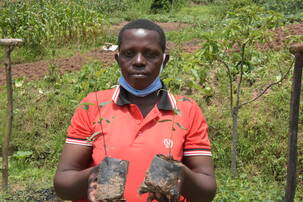RWEE project improving the entrepreneurial potential of rural women in Rwanda

Maria Mukamana is engaged in grafting and seed multiplication of fruit trees and trees in her rural area in Nyagisozi sector, Nyaruguru district. This kind of work was long considered by the rural women to be man’s work and for those who had gone to school.
The mother of three children of ages between 25 years and 4 years old, multiplies and grafts seeds of Eucalyptus, Pawpaw, Avocado, mango, and tree tomato. Her nursery beds now have about 120 000 fruit and tree seedlings.
Through other government partners Maria was trained in the skill, but was unable to apply it because she didn’t give it much attention since such activity was not popular in her area and among women.
In 2018, she became a participant to the joint Programme on “Accelerating Progress towards the Economic Empowerment of Rural Women (JPRWEE),” a pilot programme implemented by the UN Food and Agriculture Organization (FAO), UN World Food Programme (WFP), UN-Women and WFP, International Fund for Agricultural Development (IFAD). The Joint Programme aims to promote rural women’s economic empowerment through securing rural women’s livelihoods and rights in the context of sustainable development.
Through the JPRWEE programme she received training in entrepreneurship and other life skills.
“After attending the second training, I got challenged to start an income generating business. We heard amazing testimonies of farmers who had begun small but now reaping big. Building on my previously acquired grafting skills, I went back home and established seed multiplication nursery beds,” Maria said.
She began with Rwfr5 000 (USD 5). Now the business has grown to bring in over Rwfr600 000 (USD 600).
Her buyers are from her district and beyond. They use the seeds for home consumption and selling, and for timber and firewood. Each seedling is sold at between Rwfr 1 000 - 1 200.
The activity has improved the diet of her family. “We used not to consider avocadoes and other fruits as crucial food to a healthy and balanced diet. Today we eat and sell some. We used to grow maize, beans and other crops to consume at home,” she said.
In 2019, the country launched a national fruit tree planting campaign to mobilize Rwandan families to grow nutritious foods.
With more households now growing fruit trees like Pawpaw, Avocado, mango, and tree tomato, she foresees her business growing and expanding owing to the availability of the market. In her area there is only one nursery bed multiplying varieties of seedlings.
Thanks to the support from the sector leadership, she acquired a forestry certificate permitting her to continue with her work.
Maria is proud that her work is also contributing to the country’s ambition of making forestry one of the bedrocks of the economy and ensure a national ecological balance with sustainable benefits for all segments of society.
Improving household livelihood
The training also introduced to finance management which has helped her a lot in managing her business. She used the money to renovate her households which was falling in. Her husband is also a farmer. He helps her with the work in the nursery bed.
“I have managed to take my children to school and bought plots of land for my nursery beds and for other farming activities. I no longer ask the government for free health insurance, I am able to contribution to the health insurance cover for all the family members,” she said.
The business has opened doors for her. She says, on several occasions she has been asked to train other farmers in different districts.
Maria’s business was affected just like the others in Rwanda by the preventive measures to fight the spread of COVID-19. The number of clients reduced, and some trees in the nursery beds have reached a certain maturity level where they cannot be planted.
She hopes to acquire increased skills in multiplication of other seed varieties like macadamia, and expand the space to apply her innovative ideas.
